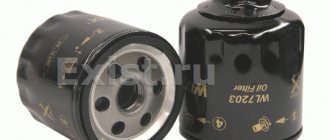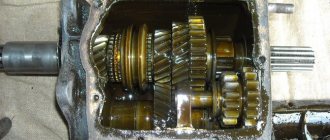September 04, 2021 Category: Useful information.
We wrote here how to choose diesel oil, and how often you need to change it here.
And recently they told us how to check the oil level with a dipstick, top it up to the level and change the lubricant in a diesel internal combustion engine.
But what to do if, when checking or changing the oil, you find that it has “gotten bad”? What problems with the engine does black, thick or too thin oil, foam or emulsion indicate?
Why does motor oil quickly thicken and become similar to grease?
Darkening of the oil is not the only sign of a change in its properties over time. Some drivers, when checking the oil level, are surprised to find that the composition has become thick and viscous, similar to grease, jelly or condensed milk. Such oil flows slowly down the dipstick, and its excessive thickness is a sign of a dangerous problem.
There are many reasons for oil thickening, and they may be different in each individual case.
- Any type of lubricant requires operation in a certain temperature range. As a rule, the change in viscosity at high temperatures is not as noticeable as at low temperatures. In the cold, motor oils thicken, and the problem of the thickness of the composition may appear with cold weather. As a rule, mineral oils and low-quality semi-synthetics, as well as counterfeit products, thicken greatly. This problem does not occur with high-quality synthetic or hydrocracked oils. In any case, after starting the engine, the viscosity of good motor oil should normalize. If this does not happen, it is worth thinking about the quality of the product and the correctness of the selected composition, which may not be intended for use in current weather conditions.
- As mentioned above, oil is produced over time. And, if you use motor oil for a long time without regular changes, it completely loses its properties and acquires a gel-like viscous consistency. The reason is that the composition has accumulated a huge amount of soot and contaminants. Of course, even after heating, the composition will not become more liquid. A number of problems can result from using used oil. This includes wear of all internal combustion engine parts, the appearance of noise, knocking, and even jamming of the engine.
- A dangerous reason for oil thickening is its polymerization. This process is a consequence of overheating of the car engine, as a result of which the oil components stick together, and the composition “collapses”, turning into a thick mass similar to grease. To avoid such problems, experts advise always changing the engine oil after repairing the engine.
- Another reason for the rapid thickening of oil is the so-called “SHELL effect”. This effect is named so because experts from this particular company discovered it in the 40s. Then an examination of several samples of thickened motor oil was carried out, during which it turned out that the oil can decompose and thicken when it gets into the composition of antifreeze and water. It should be noted that the reaction does not happen with every motor oil, and such cases are quite rare. However, this reason should not be discounted.
- Many service station specialists cite the use of low-quality gasoline as the reason for the rapid thickening of engine oil. In theory, products of incomplete combustion of fuel can react with the active components of motor oil, as a result of which the composition decomposes and loses its properties. Such arguments were and remain very dubious, since the volume of fuel that can get into the crankcase cannot be compared with the volume of oil that is located there. In addition, gasoline entering the crankcase almost immediately evaporates under the influence of high temperatures. It is also worth noting that when mixing gasoline with motor oil, you can observe a completely opposite reaction - the viscosity of the motor oil almost always decreases, not increases. In addition, the problem of oil thickening is relevant for both gasoline and diesel cars.
- The quality of the composition is not the last reason for the rapid loss of its properties and thickening. This could be an accidentally purchased fake, or “experiments” using motor oils from little-known manufacturers, or filling up motor oil in not very conscientious car repair shops.
What to do if it thickens and becomes like grease
One of the worst things to happen to motor oil is excessive thickening. You took out the dipstick, but it is all black and oil does not drain from it, is it thick, similar in consistency to condensed milk, solid oil or even plasticine? If the problem is not taken seriously, the engine will start to run dry, which will lead to damage to the pistons, connecting rods and valves.
If the oil looks like solid oil, contact a specialist immediately
There are many reasons for this phenomenon:
- polymerization - gluing components under the influence of high temperatures;
- oxidation, which occurs due to the effect of hot air on lubricating components;
- if you do not change the substance for a long time, coke and oxides will appear in it, which also increase viscosity;
- water ingress, formation of stable emulsions, oil may curdle.
How to fix?
- Check what the engine operating temperature is.
- Test to see if the fuel burns efficiently.
- Examine the oil for the presence of water and air.
- Use only the best lubricants.
If such a problem occurs, it is better to contact a car service as soon as possible.
Improper use of oil can lead to many problems. Some of them are easy to fix, some require expensive actions. Any problems can be avoided if you only fill your car with high-quality oil, follow the manufacturer's recommended replacement intervals and monitor the general condition of the car.
Hello! My name is Dmitry, I am a journalist by training. I specialize in automotive topics - I started my career in an online store of automotive components, and I myself am a car enthusiast. (9 votes, average: 4.1 out of 5)
How to avoid rapid thickening of engine oil?
Whatever the reason for the rapid thickening of the oil, the composition must be urgently replaced.
The consequences of using thickened oil can be problems with starting the engine, poor response to pressing the gas pedal, and even failure of the internal combustion engine. To make sure your motor oil is doing its job effectively, follow these expert tips :
- If you use the services of car service specialists, bring with you a canister of high-quality motor oil that you are confident in. Of course, there is always the possibility of purchasing a low-quality product, but it is quite low compared to what can be filled from large-volume barrels that are used by car repair shops.
- Check the properties of the engine oil on the dipstick more often, then you will always be sure of its optimal condition.
- We recommend periodically unscrewing the oil filler plug. This may indicate problems with the oil. If all is well, the plug will remain almost clean, and the oil film will be of a relatively light and stable consistency. If the oil begins to lose its properties, thick, darkened deposits will appear on the lid, which will indicate the need to change the oil.
In order not to run into fake products, you should only purchase motor oils from trusted stores that can guarantee the originality and quality of the products. The IXORA store always stocks original motor oils from trusted global manufacturers.
| Manufacturer | Detail number | Name |
| GENERAL MOTORS | 1942000 | Motor oil Opel Genuine Gm Motor Oil, 5W-30, synthetic, 1L |
| HONDA | 87989038 | Motor oil Honda Syntetic USA, 5W-20, synthetic, 1L |
| HONDA | 87989032 | Motor oil Honda Synthetic Blend SN Semi-syntetic USA, 5W-20, semi-synthetic, 1L |
| GENERAL MOTORS | 1942003 | Motor oil Opel Genuine Gm Motor Oil, 5W-30, synthetic, 5L |
| VOLVO | 31316300 | Motor oil Volvo SAE A1 B1 EU, 5W-30, synthetic, 4L |
| HYUNDAI | 510000451 | Motor oil Hyundai Premium Lf Gasoline SAE SMGF-4 KR, 5W-20, synthetic, 4L |
| MAZDA | 053001TFE | Motor oil DEXELIA ULTRA 5W-30, 1L |
| NISSAN | KE90090042R | Motor oil Nissan Motor Oil SLCF Synthetic EU, 5W-40, synthetic, 5L |
| ENEOS | OIL1333 | Motor oil Eneos Super Diesel CG-4 Semi-Synthetic JP, 5W-30, semi-synthetic, 4L |
| GENERAL MOTORS | 1942046 | Motor oil Opel Genuine Gm Motor Oil, 10W-40, semi-synthetic, 5L |
| HYUNDAI | 510000421 | Motor oil Hyundai Super Extra Gasoline SAE SLGF-3 KR, 5W-20, semi-synthetic, 4L |
| HYUNDAI | 520000620 | Motor oil Mobis Premium DPF Diesel, 5W-30, synthetic, 6l |
| TOYOTA | 888080846 | Motor oil Toyota Motor Oil SLCF Synthetic EU, 5W-30, synthetic, 1L |
| TOYOTA | 888080825 | Motor oil Toyota Motor Oil SL CF, 10W-40, synthetic, 5L |
| GENERAL MOTORS | 93165213 | Motor oil GM semi-synthetic GENUINE SAE 10W-40, 1L |
| VAG | G052183M2 | Motor oil VAG LongLife II 0W-30, synthetic, 1L |
| TOYOTA | 002791QT5W | Motor oil Toyota Motor Oil SN Semi-Synthetic USA, 5W-30, semi-synthetic, 1L |
| TOYOTA | 888080835 | Motor oil Toyota Motor Oil SLCF Synthetic EU, 5W-40, synthetic, 5L |
| TOYOTA | 888080836 | Motor oil Toyota Motor Oil SLCF Synthetic EU, 5W-40, synthetic, 1L |
* Please check the applicability of parts specifically for your car with our managers by phone (calls within Russia are free).
Is thicker oil for high mileage necessary or not?
Having worked in the auto industry for 14 years, I constantly hear the same type of questions, “does high mileage require thicker oil,” “can you recommend thicker oil for a car with high mileage,” and the like.
There are a lot of opinions on this topic, some say anything is possible, some say that it is possible but with the approvals of the given car manufacturer.
I think and have been convinced several times that if the engine is in order, even with high mileage, you need to pour the oil recommended by the car manufacturer for this engine model.
I had a case, a client came and said, fill me with thicker oil, a Honda Fit car with a VTEC engine. We all had an unequivocal answer, Honda oil 0W-20, but since he picked up information somewhere and decided to have thicker oil, so that the engine would run quieter and the gaps would be larger in the engine, the mileage was 180 thousand km. I bought 5W-40 oil and selected premium Mobil 1 from the line. After replacement,
the valves began to rattle. I had to take 0W-20 oil and pour it in, but for a minute, I’ll tell you that Mobil 1 oil doesn’t cost fifteen hundred rubles.
FALSE TRAIL
Let's start with the typical “excuses” of dealer service stations, on the basis of which they try to fight off warranty repairs. The inquisitive thoughts of warranty specialists usually wander in three directions - the use of low-quality fuel; antifreeze or water getting into the oil; lack of control over the engine oil level during operation.
Let’s immediately remove the third option - it is obvious that even with a very small amount of oil in the pan, it should not change its properties as we see in cases of advanced “disease”. When using “healthy” oil, the engine will react to a small amount of it by lighting up warning lights on the dashboard and sounding an alarm. First - during rolls and sudden acceleration and braking, when the receiving fungus is exposed. Any normal driver will react to this immediately. And after adding oil, you will not feel any negative consequences in the future.
The most common alleged “reason” based on which they try to revoke the warranty is the use of substandard fuel. Substandard as understood by service station mechanics is either a low octane number, or a high sulfur content in the fuel, or the presence of a large amount of resins in it. Let’s say right away that except for sulfur, everything else according to the current Technical Regulations that standardize fuel quality is not subject to control, and therefore is not subject to jurisdiction. But, since there are such attempts at excuses, we’ll check.
see also
Comments 50
Hello, what happened in the end? How was it cured? The same bullshit came up today(
Oil is crap, change brand and store
changed the engine











